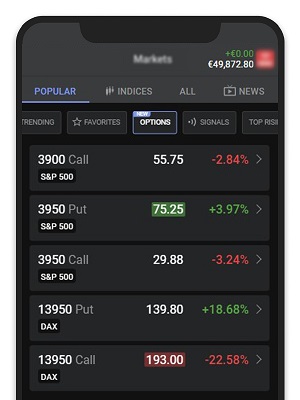

What do I need to know about options CFDs?
Options CFDs
Unlike traditional options, which are contractual obligations giving the right to purchase or sell an asset at a future date, the options CFDs we offer are derivative instruments that let you trade on the price fluctuations of a physical option without directly owning it. That means that when you close your option CFD positions, you’ll be gaining or losing the difference between the closing and opening price of the position.
Although options CFDs can exist on a variety of underlying assets, Libertex currently lets you trade options CFDs on the S&P 500 index and Brent Crude Oil. These are available in the platform’s Options section and are listed following the convention Underlying asset|Option type StrikePrice|Expiry.
Example
For example, S&P 500|Call 3450|Dec is a Call option CFD based on the S&P 500 index with a strike price of 3,450 that expires at the end of December.

It’s important to note that, since this is a CFD and not a physical option, it doesn’t mean that if you own it, you’ll be able to Buy the S&P 500 for 3,450 until the end of December. Instead, you’re just trading it as a standalone instrument and making a profit or a loss based on the change in its price.
Options CFDs vs traditional Options
Now that you understand options CFDs, some basic background on traditional options will help you trade more effectively. Traditional options are derivative financial instruments whose value depends on an underlying asset, such as a stock, equity index, or commodity. They allow the owner to buy or sell (depending on the type of contract) the underlying asset. However, unlike futures, they do not oblige the holder to buy or sell, which makes them more flexible.
- Call options give the owner the right to buy the underlying asset at a predetermined price within a certain time.
- Put options give the owner the right to sell the underlying asset at a predetermined price within a certain time.

- The underlying asset is the financial instrument whose price changes determine the value of the option.
- The strike price is the price at which the underlying asset can be bought (for Call options) or sold (for Put options) if they are exercised.
- The expiry (sometimes called expiration date) is the specific time frame within which the option can be exercised. The time until then is called “time to maturity”. Please note that the options CFDs offered on Libertex expire automatically at their maturity date. This means that the position will be closed automatically, so keep an eye on it.
What determines the price of options CFDs
Without going into excessive details and financial formulas, it is sufficient to say that the following key factors determine the value of options CFDs:
- The price of the underlying asset is, of course, the primary determinant.
- Market volatility is another key factor. Higher volatility of the underlying asset typically means a higher price for the associated options CFDs.
- The expiry also affects price: the more time there is until expiry, the more likely it is that the option will reach or exceed its strike price.
- Finally, the supply and demand for a specific options CFD will also influence its price.
Now that you understand the basics, let’s move on to why you may want to trade options CFDs.
Disclaimer: The information in this article is not intended to be and does not constitute investment advice or any other form of advice or recommendation of any sort offered or endorsed by Libertex. Past performance does not guarantee future results.
Why trade with Libertex?
- Get access to a free demo account free of charge.
- Enjoy technical support from an operator 5 days a week, from 9 a.m. to 9 p.m. (Central European Standard Time).
- Use a multiplier of up to 1:30 (for retail clients).
- Operate on a platform for any device: Libertex and MetaTrader.